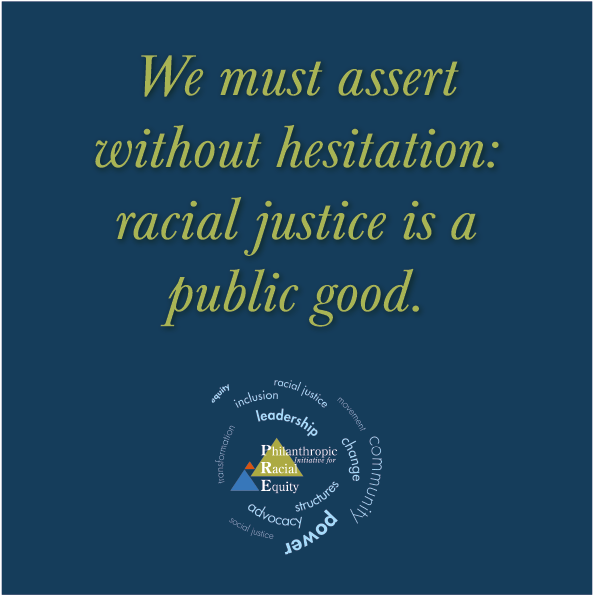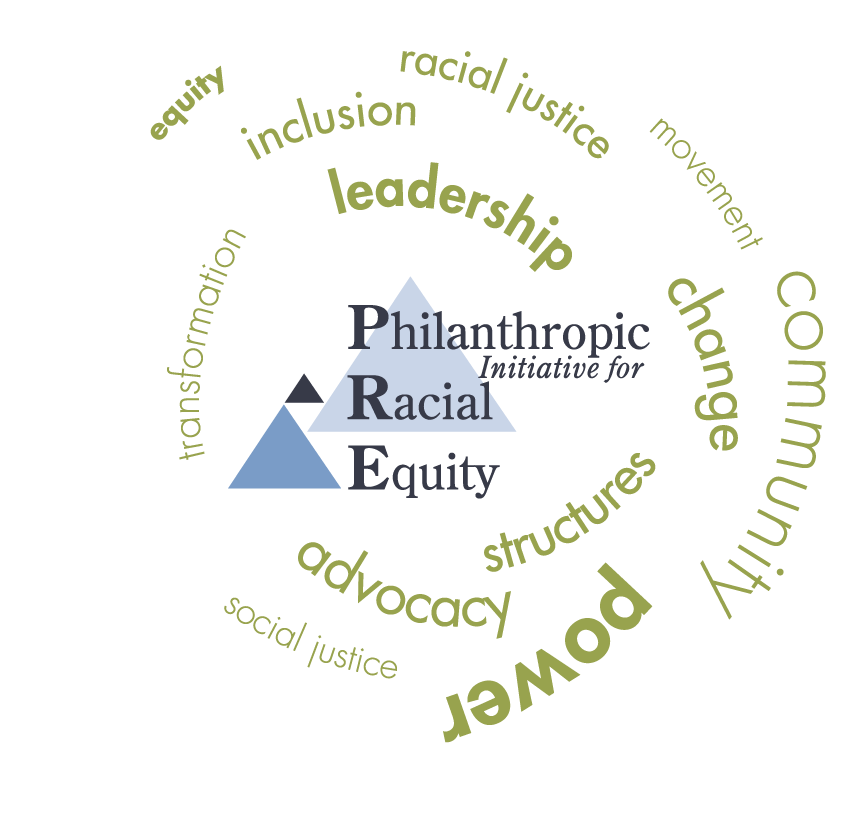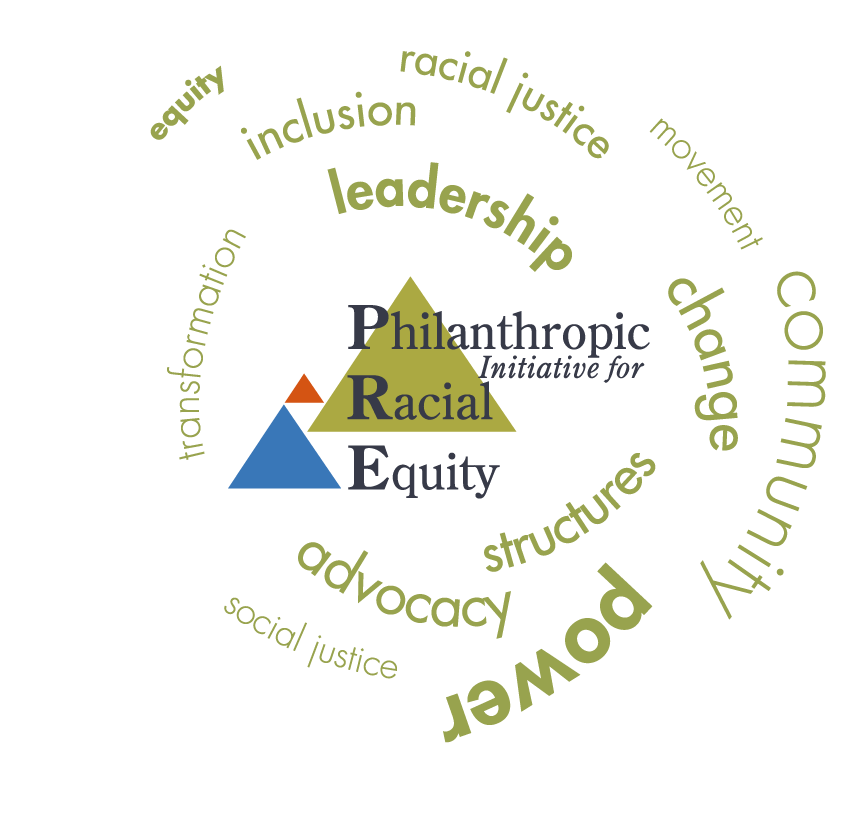Racial Justice Is a Public Good
If we defend only the right to give and not the right to give in service of equity and justice, we’ve already conceded too much.
By Lori Villarosa, Founder & Executive Director, Philanthropic Initiative for Racial Equity (PRE)
April 21, 2025
The authoritarian attack on civil society ramped up last week with threats to revoke Harvard University’s tax-exempt status, a demand by DOGE to be let into the criminal justice reform nonprofit Vera Institute of Justice, and credible reports of a looming Earth Day announcement targeting the nonprofit status of organizations tackling climate change — assaults that followed the spate of executive orders signed immediately after the inauguration that seek to facilitate the investigation of foundations with over $500M in assets, large nonprofits, and other actors that claim a mission aimed at public benefit. The entry point for these attacks has been the criminalization of diversity, equity, and inclusion, the regime’s tactic to vilify racial justice as an “illegal” ideology that must be reported, rooted out, and investigated with McCarthyite tactics.
When Donald Trump labels as “terrorists” people working on climate change, racial equity, criminal justice reform, immigration, and other vital issues, and claims that institutions committed to that work are no longer serving the public interest, it isn’t just bluster: it is a signal that he defines critical pieces of democracy, starting with racial justice, as harmful to society.
After weeks of relative quiet, philanthropy has begun responding more vocally and collectively to those executive orders — most notably with the Unite in Advance coalition and letter that has been signed by more than 300 foundations that are pushing back in defense of philanthropic independence. Nonprofit and philanthropic infrastructure associations have joined in similar statements of opposition to these attacks on the charitable sector. It’s vital to stand together against power grabs to take over and ultimately destroy civil society.
But solidarity demands specificity.
What’s under threat is not just our freedom to give; it’s the legitimacy of racial remedy, inclusion, and equity. As nonprofits and funders prepare for the battles ahead, we have to name these things as public goods explicitly and often.
The danger isn’t only external. Some foundations — under real or perceived pressure — have begun making quiet decisions that they hope will reduce risk, but instead reduce impact and safety. Behind the scenes, they ask grantees to edit websites or revise proposal language that could draw the attention of federal agencies. Some are pausing support for organizations speaking out on spotlight issues like Palestine liberation. Regardless of past success, they request avoiding anything explicit on race that could be framed as connected to diversity, inclusion or equity — despite the fact that the Administration has yet to define what exactly is illegal about such efforts.
These responses may feel protective in the short term, but over time they reinforce the myth that justice work is indefensible. Though unintentional, funders who turn to these tactics end up shrinking the space for the very values that space exists to support. This moment calls for courage — not just in defending the right to give, but in standing by the successful work accomplished by communities that define philanthropy’s purpose.
As Scot Nakagawa writes, the ‘anti-woke’ campaign isn’t just about rhetoric — it’s a strategic effort ‘to delegitimize civil rights concerns by dismissing them as mere ideology rather than legitimate grievances requiring redress.’ That’s what makes these attacks so dangerous: they don’t just target movements — they attempt to erase the very notion that equity is in the public interest. It’s a legal and narrative strategy to redefine what counts as charitable — and to erase not just racial justice, but also gender, environmental and economic justice from the definition of public good.
Criminalizing philanthropy, then, is not just a First Amendment fight for philanthropy’s right to give. Rather, the attack on racial equity is the opening salvo of the attack on independent institutions and the undoing of civil society — both necessary to any functioning democracy.The initial attacks have been focused squarely on communities and movements led by Black people and other people of color, Indigenous peoples, immigrants, Muslim and Palestinian communities, LGBTQ+ people, disabled people, and others on the frontlines and institutionally pushing democracy to live up to its promise.
But the damage won’t stop there. Repairing the harms of systemic racism and expanding who belongs strengthens every institution, every community, and every freedom. Recognizing this interconnectedness strengthens our collective ability to defend civil society.
These attacks on philanthropy and other institutions are a coordinated attempt to roll back decades of racial justice gains to discredit the movements, values, and people that made them possible. This is not theoretical. When political actors claim that investing in Black students or naming systemic racism is “not in the public interest,” they are laying the groundwork to strip organizations of their 501(c)(3) status.
If they succeed, philanthropy may retain the freedom to give, but have no lawful organizations left to give to.
Foundations and nonprofits must flank each other in this battle against a multipronged Rightist strategy to redefine what counts as charitable, invalidate a broad spectrum of equity efforts, and, ultimately, to obliterate the right to protest anything at all. If philanthropy only defends its form — the tax status, the First Amendment protections — and not its function, we lose.
Defense of the right to give must be matched with a willingness to defend what we give to and why. Otherwise, we concede the very notion that racial justice is a credible and necessary pursuit — work that covers a huge spectrum of activity including voter registration, organizing parents and students to transform public schools, changing local zoning policies to create affordable housing, and even some forms of service provision and mutual aid.
We must assert without hesitation: racial justice is a public good. It is central to a pluralistic, mutiracial democracy. Just like cancer research at Harvard. Just like early childhood education. Just like parks or food banks. Racial justice protects and expands democracy itself, making more room for everyone.
This is a defining moment. We can’t meet it with neutrality or retreat. We need clarity, courage and yes, solidarity. If we believe racial justice is worth funding, we have to say so and fight for it, not just to protect our institutions, but to stand with the people and movement whose rights, safety and future are on the line.
The right to give will mean nothing if we don’t defend the right to build a just and multiracial democracy. That fight is now. And philanthropy must show up.


